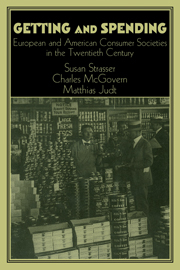Book contents
- Frontmatter
- Introduction
- Part One Politics, Markets, and the State
- Part Two Everyday Life
- 9 World War I and the Creation of Desire for Automobiles in Germany
- 10 Gender, Generation, and Consumption in the United States: Working-Class Families in the Interwar Period
- 11 Comparing Apples and Oranges: Housewives and the Politics of Consumption in Interwar Germany
- 12 “The Convenience Is Out of This World”: The Garbage Disposer and American Consumer Culture
- 13 Consumer Culture in the GDR, or How the Struggle for Antimodernity Was Lost on the Battleground of Consumer Culture
- 14 Changes in Consumption as Social Practice in West Germany During the 1950s
- 15 Reshaping Shopping Environments: The Competition Between the City of Boston and Its Suburbs
- 16 Toys, Socialization, and the Commodification of Play
- 17 The “Syndrome of the 1950s” in Switzerland: Cheap Energy, Mass Consumption, and the Environment
- 18 Reflecting on Ethnic Imagery in the Landscape of Commerce, 1945-1975
- Part Three History and Theory
- Index
14 - Changes in Consumption as Social Practice in West Germany During the 1950s
Published online by Cambridge University Press: 05 January 2013
- Frontmatter
- Introduction
- Part One Politics, Markets, and the State
- Part Two Everyday Life
- 9 World War I and the Creation of Desire for Automobiles in Germany
- 10 Gender, Generation, and Consumption in the United States: Working-Class Families in the Interwar Period
- 11 Comparing Apples and Oranges: Housewives and the Politics of Consumption in Interwar Germany
- 12 “The Convenience Is Out of This World”: The Garbage Disposer and American Consumer Culture
- 13 Consumer Culture in the GDR, or How the Struggle for Antimodernity Was Lost on the Battleground of Consumer Culture
- 14 Changes in Consumption as Social Practice in West Germany During the 1950s
- 15 Reshaping Shopping Environments: The Competition Between the City of Boston and Its Suburbs
- 16 Toys, Socialization, and the Commodification of Play
- 17 The “Syndrome of the 1950s” in Switzerland: Cheap Energy, Mass Consumption, and the Environment
- 18 Reflecting on Ethnic Imagery in the Landscape of Commerce, 1945-1975
- Part Three History and Theory
- Index
Summary
At the beginning of the 1950s, West Germany had not yet started to develop into a “consumer society.” The preconditions for this development, at least in embryonic form, could nevertheless already be seen. By the end of the decade, even people on very limited household budgets were able to afford some of the new consumer products flowing from the country's prodigious factories. Consumption of these products, however, required people to learn new skills. Accordingly, to examine the development of consumption during the postwar years, it is necessary to look at the multifaceted changes in people s everyday practice.
In this chapter, “consumption” is used in a broad sense and incorporates not only the “production of consumption” but also what Marx, in his Theses on Feuerbach, called “sensual” human activity or “practice.” The term must connote more than the mere consumption of food or possession of goods. Analyzing the “practice of consumption” does not mean simply chronicling the quantitative consumption patterns of working-class families - what and how much they generally ate - but also examining how food was bought and cooked and how cooking technology changed. Finally, we must also investigate the fabrication of representations and associations connected with food and consumption, that is, the “production” of embedded cultural meanings.
- Type
- Chapter
- Information
- Getting and SpendingEuropean and American Consumer Societies in the Twentieth Century, pp. 301 - 316Publisher: Cambridge University PressPrint publication year: 1998
- 3
- Cited by



